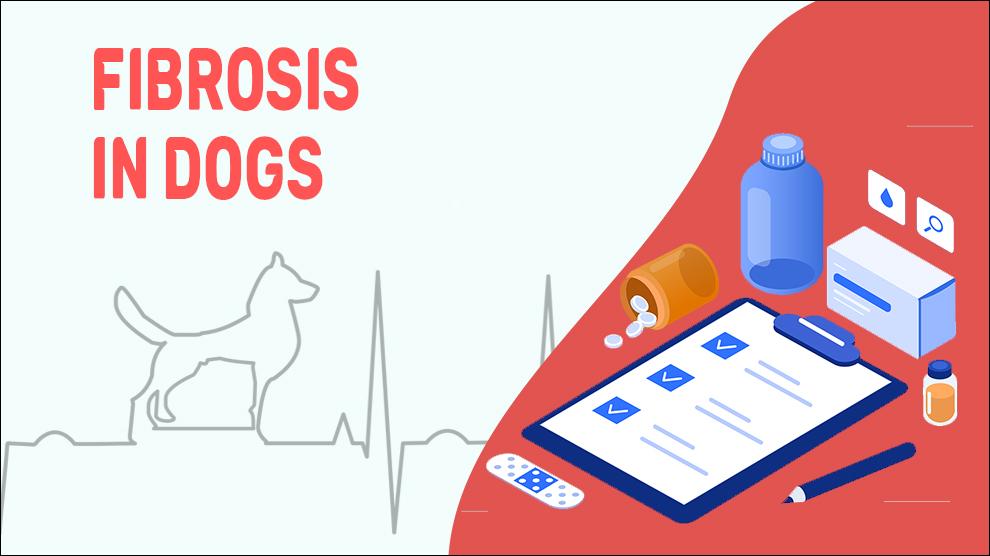What Is Fibrosis In Dogs?
Fibrosis is a reparative response to injury or damage with excessive matrix deposition in the fibrous connective tissues resulting in impairment of organ function.
This connective tissue deposition occurs as part of normal wound healing response and when excess tissue deposition occurs, it becomes a pathological process. Fibrosis is the outcome of chronic inflammatory reactions stimulated by various stimuli including autoimmune reactions, persistent infections, chemical insults, allergic responses, tissue injury, and radiation.
The term ‘scarring’ is used when fibrosis occurs in response to injury. Fibrosis is attributed to excess deposition of extracellular matrix components including collagen and it is hardening, scarring, and/or overgrowth of a variety of tissues.
The most prevalent fibrotic diseases in dogs are pulmonary fibrosis, liver cirrhosis, systemic sclerosis, cardiovascular fibrosis, and cystic fibrosis. Although present treatments for fibrotic diseases tend to target the inflammatory response, evidence reported nowadays indicates that the mechanisms regulating fibrogenesis are separate from those driving inflammation.
Symptoms Of Fibrosis In Dogs
Fibrosis symptoms vary depending on the location
Pulmonary fibrosis symptoms
- Wheezing
- Cough
- Open-mouthed breathing
- Syncope (dizziness and fainting)
- Cyanosis (bluish color to their skin)
Liver cirrhosis symptoms
- Yellowish eyes, gums, or tongue (jaundice)
- Tendency to bleed or bruise early
- Ascites or fluid buildup in the abdomen
- Chronic intermittent vomiting
- Diarrhea
- Loss of appetite
- Frequent urination
- Disorientation and drowsiness
Cardiac fibrosis symptoms
- Weakness
- Collapse
- Slow/fast/erratic heart rate
- Exercise intolerance
- Labored breathing
- Lack of appetite
- Increased respiratory rate
Treatment Options For Fibrosis In Dogs
The aim of fibrosis treatment is symptomatically address the underlying cause of the condition. Efforts are geared towards preventing the progression of fibrosis and relieving manifested symptoms.
- In case of liver cirrhosis: Therapeutic abdominocentesis - when the amount of abdominal distention is compromising the dog’s ability to breathe, the excess fluid from the abdomen will be removed)
- Diuretics (like Spironolactone, Furosemide, torsemide, and bumetanide) to promote fluid excretion
- Intravenous fluids in cases of shock or dehydration
- Antihypertensive medications- metolazone (Mykron, Zaroxolyn), Mannitol (Osmitrol)
- Antibiotic medications if the infection is suspected
Management of clinical signs is best achieved in the promptness of the treatment.
Other drugs and the need for surgery will be entirely at your vets’ disposal after determining the severity of the infection.
Home Remedies For Fibrosis In Dogs
Follow the appropriate monitoring schedule for your pet given by the vet, as recommendations may vary for each individual.
Discuss home treatments with your vet to ensure there won’t mess with other medications.
This may include dietary changes, exercise, supplements to administer, and other holistic treatments.
How To Prevent Fibrosis In Dogs?
There is no way of prevention other than sticking to the basics
- Start a nutritionally sound diet early
- Exercise your dog the right way
- Regular visits to the vet including yearly once comprehensive examination
- Ask your veterinarian about gastrointestinal supplements
- Maintain your dog’s optimal weight
Affected Dog Breeds Of Fibrosis
Affected breeds depend on the type of fibrosis.
For instance, in the case of Cardiac fibrosis.
Boxer, Cavalier King Charles Spaniel, Chihuahua, Cocker Spaniel, Doberman Pinscher, Lhasa Apso, Old English Sheepdog, Toy Poodle, Samoyed, Schnauzer, Yorkshire Terrier, West Highland White Terrier, Middle Age Dogs, Senior Dogs
Causes And Diagnosis For Fibrosisa In Dogs
1. Causes:
Liver - Schistosomiasis and Viral hepatitis
Lung - There are more than 150 different causes of interstitial lung diseases (ILDs) including silicosis, sarcoidosis, infections, drug reactions, and collagen vascular diseases, such as systemic sclerosis (scleroderma) and rheumatoid arthritis. The most common type of ILD is Idiopathic pulmonary fibrosis.
Kidney disease - Diabetes and Untreated hypertension.
Heart and vascular disease - Atherosclerosis, Heart attack, Hypertension, and restenosis.
Eye - Retinal, vitreal retinopathy, and Macular degeneration.
Skin - Scleroderma, Systemic sclerosis, burns, keloids, and hypertrophic scars.
Pancreas - Hereditary/ autoimmune causes.
Intestine - Inflammatory bowel disease.
Bone marrow - Aging and Cancer.
Multi-organ fibrosis -
- Chemotherapeutic drug-induced fibrosis
- Surgical complications
- Radiation-induced fibrosis due to accidental exposure/ cancer therapy
- Mechanical injuries
2. Mortality: There are different types of fibrotic diseases and in general, they are highly fatal. If left untreated, this can lead to irreversible complications and ultimately lead to death
3. Diagnosis:
In case of cardiac fibrosis:
- Complete blood count, chemistry panel
- Urinalysis
- X-rays
- Serum chemistry profile
- Electrocardiogram
- Cardiac ultrasound
- Echocardiography
4. Prognosis:
Most dogs with mild symptoms recover within a week and the prognosis is good. However, recovery takes longer in severe fibrotic cases, as complications may need additional treatment. Systemic fibrosis can be treated initially but if left untreated over a long time, it gets worsened and there is no cure but the related symptoms (pain) can be prevented or may be managed.
When To See A Vet For Fibrosis In Dogs?
Contact your vet right away, if you notice any of the following:
- Tarry feces, Intermittent black or bloody diarrhea
- Redness in the “sclera” of the eye
- Severe unsteadiness or loss of muscle control, Confusion or disorientation
Food Suggestions For Fibrosis In Dogs
- 40% protein – Animal meat (avoid raw meat), Lean boiled meats, seafood, eggs
- 50% fresh vegetables
- 10% carbohydrates – Brown rice, Barley (pearled), grains
- Fatty acids – Cooked egg yolks, plant oils, sunflower, corn
- Avoid trans fat, a small amount of beef fat, steak fat
- Calcium – Powdered or crushed eggshells, supplements
- Antioxidant foods
Conclusion
Generally, the diagnosis of Fibrosis could be confusing considering the multitude of diseases implicated in the condition. Treatment is reliant on proper detection of the cause of fibrosis. It clearly reveals that fibrosis is only treatable when the cause is properly diagnosed. So when you suspect something is not right, visit the vet for further clarifications.

















